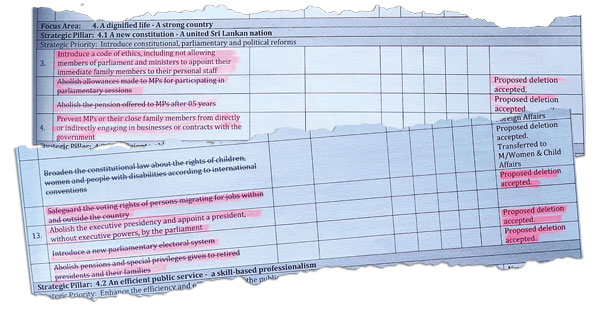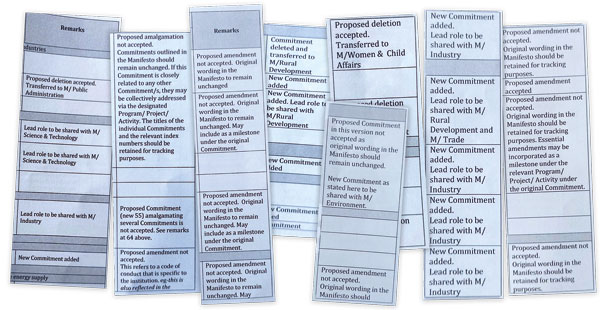News
Cabinet nod for bills to scrap special benefits of ex-presidents and ex-MPs’ pensions
View(s):- But Justice Minister’s clarification leaves several unanswered questions over
deletions pointed out by the Sunday Times story last week
By Namini Wijedasa
The Cabinet this week approved a proposal to instruct the Legal Draftsman to produce two bills—one to remove (“repeal”) the special benefits of former presidents and their families and the other to cancel the pension paid to parliamentarians after five years of service.
Justice Minister Harshana Nanayakkara submitted the relevant memorandum to change the Presidents’ Entitlements Act No. 4 of 1986 and the Parliamentary Pensions Law No. 1 of 1977.
The Cabinet decision was adopted a day after the Sunday Times wrote that the government has deleted from the Justice Ministry’s action plan its commitment to abolish the privileges of former presidents.

Minister Nanayakkara denied our report in Parliament (stopping just short of calling it “fake news”) and said the pledges—which are part of the National People’s Power (NPP) election manifesto—were merely shifted from his ministry to the Presidential Secretariat.
However, this newspaper drew its information from an annexure attached to a circular President Anura Kumara Dissanayake’s office sent to ministry secretaries in March, directing them to treat the National People’s Power (NPP) election manifesto as the country’s policy framework.
The 194-page document was obtained through the Right to Information Act.
A handful of outright deletions
Alongside a large number of entries under the Justice and National Integration Ministry, the one to “abolish pensions and special privileges given to retired presidents and their families” is crossed out with the comment “proposed deletion accepted”.
We did not report on the parliamentary pension. But we can now reveal that in the action plan of another office—the Ministry of Public Security and Parliamentary Affairs—the election promises to “abolish allowances made to MPs for participating in parliamentary sessions” and “abolish the pension offered to MPs after 05 years” are also marked as “proposed deletion accepted”.

Similarly struck off from the Justice Ministry’s list is the establishment of a Commission against Discrimination, with a legal mandate; the introduction of a new parliamentary electoral system; and the safeguarding of the voting rights of persons migrating for jobs within and outside the country.
And deleted from the Public Security and Parliamentary Affairs Ministry is the undertaking “to empower the Police Commission to make all appointments, promotions and transfers in the police service without politicisation”.
Under the Public Administration, Provincial Councils and Local Government Ministry, the commitment to “ensure that recruitment, promotions, and transfers in the public sector are based on qualifications and skills without political interference” is crossed out (“proposed deletion accepted”).
The same applies to revising “the rules and regulations for appointments and promotions of officers to all types of services in the government service within a particular timeframe”.
The final instance of a pledge being completely struck off is “ensure youth representation in ministerial advisory councils”.
There are no other undertakings in the document with the single comment “proposed deletion accepted” in the remarks column.
Where transfers did happen
What of Minister Nanayakkara’s claim that proposals related to the privileges of past presidents and parliamentary pensions were transferred to the President’s office?
There isn’t any indication of that in the detailed and neatly categorised list that makes up the annexure. However, there are ample other examples of the document explicitly stating when responsibilities are transferred from one institution to another.
Under the Justice Ministry, for instance, the entry “expand constitutional protections to ensure no discrimination based on gender identity or sexual orientation” is crossed out. However, the remarks column clarifies: “Proposed deletion accepted. Transferred to M/Women & Child Affairs.”
The task to “create a dedicated secretariat to protect the rights of marginalised groups” is struck through and described as “proposed deletion accepted. Transferred to M/Rural Development.”
The pledge to “establish a more efficient mechanism for collecting child victims’ testimonies and improving the current investigative process to minimise their re-victimisation” is crossed out, with the caveat: “Proposed deletion accepted. Transferred to M/Women & Child Affairs.”
The recognition and enactment of rights enshrined in the International Covenant on Civil and Political Rights as basic rights is moved to the Ministry of Foreign Affairs.
Responsibility for “broadening the constitutional law about the rights of children, women and people with disabilities according to international conventions” is transferred from the Justice Ministry to the Ministry of Women & Child Affairs.
So many explanations
Aside from this, changes are explained through several common remarks. New commitments have been added; lead ministries have been assigned (where there are overlaps); shared duties are described; commitments have been removed owing to repetition; and a few commitments are described as “retained” while the deletion of certain others is “not accepted”.
Some commitments are “edited as in the manifesto”. There are instances where it states, “Proposed commitment in this version is not accepted as original wording in the manifesto should remain unchanged.”
In some places, it is clarified, “Proposed new commitment not accepted as it is not in the manifesto”—or there is no “specific reference” to it in the manifesto. These are permitted to be included as milestones under other categories.
There is also this: “Proposed amalgamation not accepted. Commitments outlined in the manifesto should remain unchanged. If this commitment is closely related to any other commitment/s, they may be collectively addressed via the designation programme/project/activity. The titles of the individual commitments and the relevant index numbers should be retained for tracking purposes.”
It is not immediately clear, therefore, why an exhaustive document annexed to a Presidential Secretariat circular did not state that the two leading commitments Minister Nanayakkara referred to were deleted from his ministry but assigned anew to the President’s own office—especially when the document shows multiple other instances of duties being removed from one institution and shifted to another.
And had the commitments been thus moved to the President’s office, it remains unclear why Cabinet instructed the Justice Minister, and not the Presidential Secretariat, to take the matter up with the Legal Draftsman. Were they shuttled back?
The best way to say that you found the home of your dreams is by finding it on Hitad.lk. We have listings for apartments for sale or rent in Sri Lanka, no matter what locale you're looking for! Whether you live in Colombo, Galle, Kandy, Matara, Jaffna and more - we've got them all!

